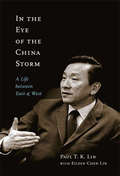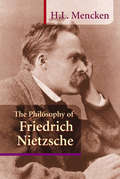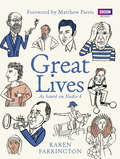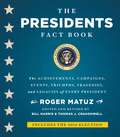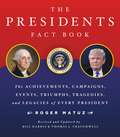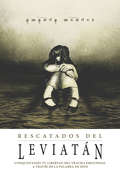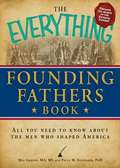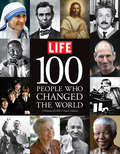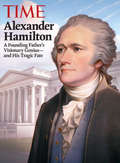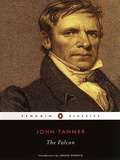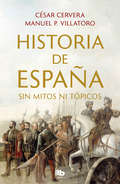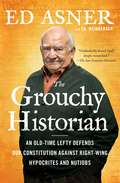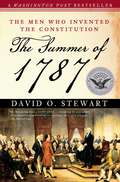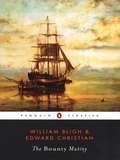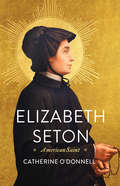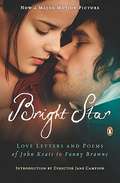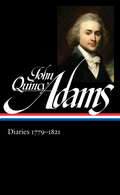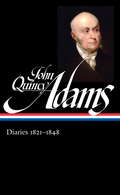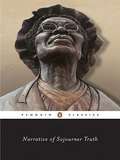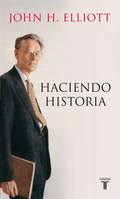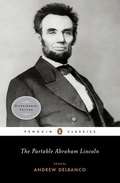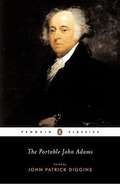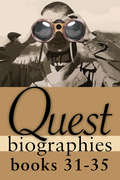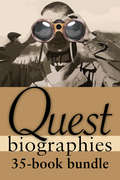- Table View
- List View
In the Eye of the China Storm
by Eileen Chen Lin Paul T. K. LinBorn in Vancouver in 1920 to immigrant parents, Lin became a passionate advocate for China while attending university in the United States. With the establishment of the People's Republic, and growing Cold War sentiment, Lin abandoned his doctoral studies, moving to China with his wife and two young sons. He spent the next fifteen years participating in the country's revolutionary transformation. In 1964, concerned by the political climate under Mao and determined to bridge the growing divide between China and the West, Lin returned to Canada with his family and was appointed head of McGill University's Centre for East Asian Studies. Throughout his distinguished career, Lin was sought after as an authority on China. His commitment to building bridges between China and the West contributed to the establishment of diplomatic relations between Canada and China in 1970, to US President Richard Nixon's visit to China in 1972, and to the creation of numerous cultural, academic, and trade exchanges. In the Eye of the China Storm is the story of Paul Lin's life and of his efforts - as a scholar, teacher, business consultant, and community leader - to overcome the mutual suspicion that distanced China from the West. A proud patriot, he was devastated by the Chinese government's violent suppression of student protestors at Tiananmen Square in June 1989, but never lost faith in the Chinese people, nor hope for China's bright future.
The Philosophy of Friedrich Nietzsche
by H. L. MenckenThe first book on Nietzsche ever to appear in English, this examination by legendary journalist H. L. Mencken is still one of the most enlightening. Mencken wrote this book while still in his 20s, but his penchant for thoroughness was evident even at that young age--in preparation for writing this book, he read Nietzsche's works in their entirety, mostly in the original German. A brief biographical sketch is followed by clear and thorough explanations of Nietzsche's basic concepts and attitudes. Analyzed are Nietzsche's much-misunderstood concept of the superman, his concept of eternal recurrence, his rejection of Christianity, and his basic rationalism and materialism. Included are two essays on Nietzsche that appeared in Mencken's magazine The Smart Set subsequent to the publishing of the original edition of this book. Nearly a century after its original publication, this remains one of the clearest, most concise, and entertaining introductions to Nietzsche to date.
Great Lives: As heard on Radio 4
by Karen FarringtonBased on the popular Radio 4 series, Great Lives highlights some of the world's most fascinating and influential characters. Chosen by the show's guests, each biography reveals the life and times of artists, sportsmen, statesmen, authors, monarchs, actors, musicians and scientists, showing why they inspire, what they achieved and how they have influenced the world at large. Discover the intriguing lives of Clement Attlee and Henri Matisse, King Alfred and Samuel Johnson, Tommy Cooper and Robert Kennedy, Robin Day and Edith Wharton, along with many more. From the famous to the obscure, the historical to the contemporary, each biography provides an insight into the character's personality, why they were driven to achieve so much, and separates fact from fiction. With a foreword by the show's presenter, Matthew Parris, Great Lives is an ideal gift for history and biography enthusiasts, and for fans of the Radio 4 series.
Presidents Fact Book Revised and Updated!
by Bill Harris Roger Matuz Thomas J. CraughwellIn time for the 2015 presidential election cycle, this revised paperback edition is the most comprehensive, up-to-date guide on the presidents and includes the milestones of Barack Obama's first and second terms.The Presidents Fact Book is a complete compendium of all things presidential and a sweeping survey of American history through the biographical lens of every president from George Washington to Barack Obama. Organized chronologically by president, each entry covers the major accomplishments and events of the presidential term; cabinet members, election results, groundbreaking legislation, and Supreme Court appointments; personality and personal habits; career before the presidency; a behind-the-scenes look at the wives, families, friends, and foes; and much more, including hobbies, odd behaviors, and outlandish penchants. Major primary documents from each administration--from the Bill of Rights to Barack Obama's speech on race in America--provide a glimpse into the crucial moments of America's storied past in the words of those who were at the helm. Perfect for students, history buffs, and political junkies, The President's Fact Book is at once an expansive collage of our nation's 44 individual presidents and a comprehensive view of American history.
Presidents Fact Book Revised and Updated!: The Achievements, Campaigns, Events, Triumphs, and Legacies of Every President from George Washington to the Current One
by Bill Harris Thomas J. Craughwell Roger MatuzAn All-New Edition! The Presidents Fact Book is a complete compendium of all things presidential and a sweeping survey of American history through the biographical lens of every president from George Washington through Donald Trump. Organized chronologically by president, each entry covers the major accomplishments and events of the presidential term; cabinet members, election results, groundbreaking legislation, and Supreme Court appointments; personality and personal habits; career before the presidency; a behind-the-scenes look at the wives, families, friends, and foes; and much more, including hobbies, odd behaviors, and outlandish penchants. Major primary documents from each administration-from the Bill of Rights to Barack Obama's speech on race in America-provide a glimpse into the crucial moments of America's storied past in the words of those who led the nation. Perfect for students, history buffs, and political junkies, The President's Fact Book is at once an expansive collage of our nation's 45 individual presidents and a comprehensive view of American history.
Rescatados del Leviatan: Conquistando Tu Libertad Del Trauma Emocional A Través De La Palabra De Dios
by Amanda Mendez¿Te has encontrado atrapado en las mentiras del enemigo y su encarcelamiento mental? ¿Luchas con el abuso emocional o físico o el abandono? Al confiar en Jesús, puedes vencer la vergüenza y la culpa que han gobernado tu vida por años. Por medio de su propia historia en Rescatados del Leviatán, y con la ayuda del Espíritu Santo, Amanda Méndez te muestra cómo matar al monstruo que intenta destruirte. Comienza a asesinar a la bestia de la condenación, y descubre la paz y la liberación de Leviatán hoy.
The Everything Founding Fathers Book: All You Need to Know About the Men Who Shaped America
by Meg Greene Paula M. StathakisGeorge Washington. John Adams. Benjamin Franklin. These great leaders--and many others--made innumerable contributions that laid the groundwork for our nation. But who were they really? In actuality, the founding fathers were a diverse group of men and not the homogenous collection history has shaped them into. Some were puritanical but some were philanderers; some were wealthy while others were plagued with money woes. Inside you'll discover the triumphs, failures, and little-known facts about our founding fathers, including: Why George Washington never lived in the White House What John Adams and Thomas Jefferson stole from Shakespeare's birthplace Why Alexander Hamilton never ran for president How Thomas Paine narrowly escaped execution in France Why Thomas Jefferson kept grizzly bears on the White House lawn Featuring fun quizzes to test your knowledge, this book uncovers both the great accomplishments and also the very human flaws of the founding fathers and brings them to life like no dry history book can!
LIFE 100 People Who Changed the World
by Editors of LifeHere is a book that will surely spark a lively debate. Who are the hundred most influential religious and political leaders, artists, scientists, and adventurers of all time? How is it even possible to construct such a list? Now, the editors of LIFE comb history, compare notes and dive in. Find out who makes the cut: King Tut or Cleopatra? Thomas Jefferson or George Washington; The Rolling Stones or The Beatles; Steve Jobs or Bill Gates. This is a look at history told through its most charismatic and fascinating characters. It is also full of fun facts, tidbits, arguments and rarely seen pictures, and will appeal to curious minds, young and old alike.
TIME Alexander Hamilton: A Founding Father's Visionary Genius and His Tragic Fate
by Editors of TIMELong considered the forgotten founding father and primarily known for the duel with Aaron Burr that ended his life, Alexander Hamilton has recently achieved a new level of fame because of the hit Broadway musical Hamilton, inspired by the New York Times best-selling biography by acclaimed historian Ron Chernow.Now the editors of TIME present this special edition that celebrates Hamilton and his many accomplishments: as one of the primary architects of the Constitution, an aide and counsel to General George Washington, and the first secretary of the Treasury, as well as his intense, long-standing rivalry with Thomas Jefferson and how it affects our government to this day. Also included in this fully illustrated edition are "Six Things You Didn't Know About Alexander Hamilton," an interview with Chernow, the making of the Broadway musical, why Hamilton's days on the $10 bill are numbered, and much more.TIME brings keen insight to the improbable life of the illegitimate son of a Caribbean merchant who would go on to help shape our nation, lay the foundation for the modern economy, and become the inspiration for a musical that is inspiring Americans to interpret history in an entirely new way.
The Falcon
by John TannerJohn Tanner's fascinating autobiography tells the story of a man torn between white society and the Native Americans with whom he identified. .
Historia de España sin mitos ni tópicos
by César Cervera Manuel P. VillatoroUn recorrido didáctico y rico por los grandes hechos y personajes que marcaron la historia de España. Los mitos han perseguido a España desde que Escipión Emiliano sitió Numancia. Durante los siguientes siglos se han esgrimido una retahíla de falacias sobre este país que, a golpe de repetirse, han forjado la llamada Leyenda Negra. Este libro se enfrenta a todas ellas. Desde la idea de que la brutalidad campó a sus anchas a partir del siglo XVI, hasta la que muestra a los conquistadores como bárbaros sedientos de sangre. Con la veracidad y el rigor de los datos por estandarte, y bajo la premisa de buscar siempre una divulgación amena, los periodistas César Cervera y Manuel Villatoro abordan en estas páginas las gestas más reconocidas de las tropas españolas a lo largo de dos mil años, las peripecias más llamativas de los monarcas que han dirigido este país o, entre otras muchas cosas, los hitos más destacados de su pasado. Un paseo rico y fascinante para acercarnos un poco más al relato más apasionante de todos: el de nuestra historia. Algunos lectores ilustres han dicho...«Un ramillete de artículos que responden a la máxima horaciana de enseñar deleitando (prodesse et delectare). ¿Qué más se puede desear?»Juan Eslava Galán «César Cervera y Manu Villatoro convierten la historia de España en noticia de portada que no te puedes perder. ¡Imprescindible!»Isabel San Sebastián «Estos jóvenes periodistas han conseguido contar la historia de España como si fuera el mejor de los reportajes: riguroso, ágil, veraz, informativo y ameno.»Antonio Pérez Henares
The Grouchy Historian: An Old-Time Lefty Defends Our Constitution Against Right-Wing Hypocrites and Nutjobs
by Ed Asner Ed. WeinbergerIn the tradition of Al Franken and Michael Moore, Ed Asner—a.k.a. Lou Grant from The Mary Tyler Moore Show—reclaims the Constitution from the right-wingers who think that they and only they know how to interpret it.Ed Asner, a self-proclaimed dauntless Democrat from the old days, figured that if the right-wing wackos are wrong about voter fraud, Obama’s death panels, and climate change, they are probably just as wrong about what the Constitution says. There’s no way that two hundred-plus years later, the right-wing ideologues know how to interpret the Constitution. On their way home from Philadelphia the people who wrote it couldn’t agree on what it meant. What was the president’s job? Who knew? All they knew was that the president was going to be George Washington and as long as he was in charge, that was good enough. When Hamilton wanted to start a national bank, Madison told him that it was unconstitutional. Both men had been in the room when the Constitution was written. And now today there are politicians and judges who claim that they know the original meaning of the Constitution. Are you kidding? In The Grouchy Historian, Ed Asner leads the charge for liberals to reclaim the Constitution from the right-wingers who use it as their justification for doing whatever terrible thing they want to do, which is usually to comfort the comfortable and afflict the afflicted. It’s about time someone gave them hell and explained that progressives can read, too.
The Summer of 1787
by David O. StewartThe Summer of 1787 takes us into the sweltering room in which the founding fathers struggled for four months to produce the Constitution: the flawed but enduring document that would define the nation--then and now.George Washington presided, James Madison kept the notes, Benjamin Franklin offered wisdom and humor at crucial times. The Summer of 1787 traces the struggles within the Philadelphia Convention as the delegates hammered out the charter for the world's first constitutional democracy. Relying on the words of the delegates themselves to explore the Convention's sharp conflicts and hard bargaining, David O. Stewart lays out the passions and contradictions of the, often, painful process of writing the Constitution. It was a desperate balancing act. Revolutionary principles required that the people have power, but could the people be trusted? Would a stronger central government leave room for the states? Would the small states accept a Congress in which seats were allotted according to population rather than to each sovereign state? And what of slavery? The supercharged debates over America's original sin led to the most creative and most disappointing political deals of the Convention. The room was crowded with colorful and passionate characters, some known--Alexander Hamilton, Gouverneur Morris, Edmund Randolph--and others largely forgotten. At different points during that sultry summer, more than half of the delegates threatened to walk out, and some actually did, but Washington's quiet leadership and the delegates' inspired compromises held the Convention together. In a country continually arguing over the document's original intent, it is fascinating to watch these powerful characters struggle toward consensus--often reluctantly--to write a flawed but living and breathing document that could evolve with the nation.
The Summer of 1787
by David O. StewartThe successful creation of the Constitution is a suspense story. The Summer of 1787 takes us into the sweltering room in which delegates struggled for four months to produce the flawed but enduring document that would define the nation -- then and now. George Washington presided, James Madison kept the notes, Benjamin Franklin offered wisdom and humor at crucial times. The Summer of 1787 traces the struggles within the Philadelphia Convention as the delegates hammered out the charter for the world's first constitutional democracy. Relying on the words of the delegates themselves to explore the Convention's sharp conflicts and hard bargaining, David O. Stewart lays out the passions and contradictions of the often painful process of writing the Constitution. It was a desperate balancing act. Revolutionary principles required that the people have power, but could the people be trusted? Would a stronger central government leave room for the states? Would the small states accept a Congress in which seats were alloted according to population rather than to each sovereign state? And what of slavery? The supercharged debates over America's original sin led to the most creative and most disappointing political deals of the Convention. The room was crowded with colorful and passionate characters, some known -- Alexander Hamilton, Gouverneur Morris, Edmund Randolph -- and others largely forgotten. At different points during that sultry summer, more than half of the delegates threatened to walk out, and some actually did, but Washington's quiet leadership and the delegates' inspired compromises held the Convention together. In a country continually arguing over the document's original intent, it is fascinating to watch these powerful characters struggle toward consensus -- often reluctantly -- to write a flawed but living and breathing document that could evolve with the nation.
The Bounty Mutiny
by William Bligh R. D. Madison Edward ChristianThe names William Bligh, Fletcher Christian, and the Bounty have excited the popular imagination for more than two hundred years. The story of this famous mutiny has many beginnings and many endings but they all intersect on an April morning in 1789 near the island known today as Tonga. That morning, William Bligh and eighteen surly seamen were expelled from the Bounty and began what would be the greatest open-boat voyage in history, sailing some 4,000 miles to safety in Timor. The mutineers led by Fletcher Christian sailed off into a mystery that has never been entirely resolved.While the full story of what drove the men to revolt or what really transpired during the struggle may never be known, Penguin Classics has brought together-for the first time in one volume-all the relevant texts and documents related to a drama that has fascinated generations. Here is the full text of Bligh's Narrative of the Mutiny, the minutes of the court proceedings gathered by Edward Christian in an effort to clear his brother's name, and the highly polemic correspondence between Bligh and Christian-all amplified by Robert Madison's illuminating Introduction and rich selection of subsequent Bounty narratives
Elizabeth Seton: American Saint
by Catherine O'DonnellIn 1975, two centuries after her birth, Pope Paul VI canonized Elizabeth Ann Seton, making her the first saint to be a native-born citizen of the United States in the Roman Catholic Church. Seton came of age in Manhattan as the city and her family struggled to rebuild themselves after the Revolution, explored both contemporary philosophy and Christianity, converted to Catholicism from her native Episcopalian faith, and built the St. Joseph’s Academy and Free School in Emmitsburg, Maryland. Hers was an exemplary early American life of struggle, ambition, questioning, and faith, and in this flowing biography, Catherine O’Donnell has given Seton her due.O’Donnell places Seton squarely in the context of the dynamic and risky years of the American and French Revolutions and their aftermath. Just as Seton’s dramatic life was studded with hardship, achievement, and grief so were the social, economic, political, and religious scenes of the Early American Republic in which she lived. O’Donnell provides the reader with a strong sense of this remarkable woman’s intelligence and compassion as she withstood her husband’s financial failures and untimely death, undertook a slow conversion to Catholicism, and struggled to reconcile her single-minded faith with her respect for others’ different choices. The fruit of her labors were the creation of a spirituality that embraced human connections as well as divine love and the American Sisters of Charity, part of an enduring global community with a specific apostolate for teaching.The trove of correspondence, journals, reflections, and community records that O’Donnell weaves together throughout Elizabeth Seton provides deep insight into her life and her world. Each source enriches our understanding of women’s friendships and choices, illuminates the relationships within the often-opaque world of early religious communities, and upends conventional wisdom about the ways Americans of different faiths competed and collaborated during the nation’s earliest years. Through her close and sympathetic reading of Seton’s letters and journals, O’Donnell reveals Seton the person and shows us how, with both pride and humility, she came to understand her own importance as Mother Seton in the years before her death in 1821.
Bright Star
by John KeatsJOHN KEATS edited with an introduction by Miriam Chalk This book gathers the most potent passages from Keats together, including the famous 'Odes', the sonnets, the luxuriously sensuous 'Eve of St Agnes', the mysterious and atmospheric 'La Belle Dame Sans Merci', and extracts from 'Lamia', Endymion and Hyperion. British Poets Series. Bibliography and notes. John Keats is one of the few British poets who is truly ecstatic and wild. Despite the overly-ornate language, the often awkward phrases ('made sweet moan' in 'La Belle Dame Sans Merci'), despite the Romantic indulgences and the sometimes sexist views, the often over-simplification of natural and human processes and experiences, and despite the tendency to gush and exaggerate, Keats is one of the few poets who write in English who is truly wild and shamanic. He is the British poet closest to the pure intoxication of Arthur Rimbaud. Keats reaches the pinnacle of British poetry, as W. Jackson Bate, typical among critics, says: 'the language of his greatest poetry has always held an attraction; for there we reach, if only for a brief while, a high plateau where in mastery of phrase he has few equals in English poetry, and only one obvious superior. '
John Quincy Adams: Diaries 1779-1821
by David Waldstreicher John Quincy AdamsFor the 250th anniversary of John Quincy Adams's birth, a landmark new edition of an American masterpiece: the incomparable self-portrait of a man and his times from the Revolution to the coming of the Civil War.The diary of John Quincy Adams is one of the most extraordinary works in American literature. Begun in 1779 at the age of twelve and kept more or less faithfully until his death almost 70 years later, it is both an unrivaled record of historical events and personalities from the nation's founding to the antebellum era and a masterpiece of American self-portraiture, tracing the spiritual, literary,and scientific interests of an exceptionally lively mind. Now, for the 250th anniversary of Adams's birth, Library of America and historian David Waldstreicher present a two-volume reader's edition based for the first time on the original manuscript diaries, restoring personal and revealing passages suppressed in earlier editions.Volume I begins during the American Revolution, with Adams's first entry, as he prepares to embark on a perilous wartime voyage to Europe with his father, diplomat John Adams, and records his early impressions of Franklin and Jefferson and of Paris on the eve of revolution; it details his abbreviated but eventful years of study at Harvard and his emergence into the world of politics in his own right, as American minister to the Netherlands and to Prussia, and then as a U. S. senator from Massachusetts; and it reveals a young man at war with his passions, before finding love with the remarkable Louisa Catherine Johnson. In passages that form a kind of real-world War and Peace, the diary follows the young married couple to St. Petersburg, where as U.S. minister Adams is a witness to Napoleon's invasion of Russia. Its account of the negotiations at Ghent to end the War of 1812, where Adams leads the American delegation, is the perhaps the most detailed and dramatic picture of a diplomatic confrontation ever recorded. Volume 1 concludes with his elevation as Secretary of State under James Monroe, as he takes the fore in a fractious cabinet and emerges as the principal architect of what will become known as the Monroe Doctrine.
John Quincy Adams: Diaries 1821-1848
by David Waldstreicher John Quincy AdamsFor the 250th anniversary of John Quincy Adams's birth, a landmark new edition of an American masterpiece: the incomparable self-portrait of a man and his times from the Revolution to the coming of the Civil War.The diary of John Quincy Adams is one of the most extraordinary works in American literature. Begun in 1779 at the age of twelve and kept more or less faithfully until his death almost 70 years later, it is both an unrivaled record of historical events and personalities from the nation's founding to the antebellum era and a masterpiece of American self-portraiture, tracing the spiritual, literary,and scientific interests of an exceptionally lively mind. Now, for the 250th anniversary of Adams's birth, Library of America and historian David Waldstreicher present a two-volume reader's edition based for the first time on the original manuscript diaries, restoring personal and revealing passages suppressed in earlier editions.Volume 2 opens with Adams serving as Secretary of State, amid political maneuverings within and outside James Monroe's cabinet to become his successor, a process that culminates in Adams's election to the presidency by the House of Representatives after the deadlocked four-way contest of 1824. Even as Adams takes the oath of office, rivals Henry Clay, his Secretary of State, John C. Calhoun, his vice president, and an embittered Andrew Jackson, eye the election of 1828. The diary records in candid detail his frustration as his far-sighted agenda for national improvement founders on the rocks of internecine political factionalism, conflict that results in his becoming only the second president, with his father, to fail to secure reelection. After a short-lived retirement, Adams returns to public service as a Congressman from Massachusetts, and for the last seventeen years of his life he leads efforts to resist the extension of slavery and to end the notorious "gag rule" that stifles debate on the issue in Congress. In 1841 he further burnishes his reputation as a scourge of the Slave Power by successfully defending African mutineers of the slave ship Amistad before the Supreme Court. The diary achieves perhaps its greatest force in its prescient anticipation of the Civil War and Emancipation, an "object," as Adams described it during the Missouri Crisis, "vast in its compass, awful in its prospects, sublime and beautiful in its issue."
Narrative of Sojourner Truth
by Sojourner TruthA symbol of the strength of African-American women, and a champion of the rights of all women, Sojourner Truth was an illiterate former slave in New York State who transformed herself into a vastly powerful orator. Dictating to a neighbor, she began her celebrated life story, in which she chronicles her youth, her 1827 emancipation, and her religious experiences, one year after the extremely successful publication in 1846 of Frederick Douglass's narrative. Truth's magnetism as an abolitionist speaker brought her fame in her own time, and her narrative gives today's readers a vivid picture of nineteenth-century life in the north, where blacks, enslaved or free, lived in relative isolation from one another. Based on the 1884 edition of the Narrative, this volume contains Book of Life, a contemporary collection of letters and biographical sketches about Truth's public appearances, including the controversial Arn't I a Woman speech and Harriet Beecher Stowe's 1863 essay, Sojourner Truth, The Libyan Sibyl as well as A Memorial Chapter about her death.
Haciendo historia
by John H. ElliottEsta autobiografía intelectual es el apasionante testimonio intelectual de uno de los más importantes historiadores contemporáneos y, al tiempo, una gran historia de amor con España. Desde la privilegiada perspectiva de sus casi sesenta años dedicado a investigar y escribir sobre historia, John H. Elliott, el más prestigioso hispanista contemporáneo, se detiene a reflexionar sobre los avances que ha experimentado el estudio de esta disciplina. Basándose en su propia experiencia como historiador de España, Europa y las Américas, el autor británico ofrece un brillante y agudo análisis del trabajo de los historiadores y de cómo ha evolucionado desde la década de los cincuenta. Elliott parte de las raíces de su interés en España y en el pasado, y de los retos que supone escribir sobre la historia de un país que no es el propio, para ir adentrándose en temas como la historia del declive de las naciones y los imperios, la historiapolítica, la biografía o la historia cultural y del arte. Analiza también los cambios que se han producido en la forma de abordar la historia en el último medio siglo, incluyendo el impacto de la tecnología digital, y defiende la crucial importancia de tener una visión de conjunto del pasado. Los amantes de la historia encontrarán en este fascinante libro una nueva apreciación del trabajo necesario para dar forma a las obras de historia y de cómo estas a su vez dan forma al mundo del pensamiento y de la acción. La crítica ha dicho...«Toda una vida dedicado a la historia lleva el autor de este maravilloso libro, que es lección magistral, confesión apasionada de amor al trabajo y ejercicio de lucidez.»Manuel Lucena, ABC «John Elliott ha publicado un libro que es en parte una memoria personal y en parte una reflexión sobre el oficio al que ha dedicado la vida. La calidez y la viveza de las rememoraciones es tan seductora como el rigor intelectual en el examen de las posibilidades, los límites, los márgenes de error e incertidumbre del conocimiento histórico.»Antonio Muñoz Molina, El País «No resulta frecuente que la erudición, la claridad y el entusiasmo se aúnen sin estridencias. Tal es el caso de John Elliott.»El Cultural «Elliott es infatigable en su investigación, global en su visión, magistral en la organización del material e infalible identificando las evidencias más reveladoras o representativas. En resumen, su labor académica es lo más cercano a la perfección que se puede encontrar.»Felipe Fernández-Armesto «Elliott es un excelente conocedor del pasado español y un extraordinario especialista en la Monarquía Hispánica. Ha podido realizar una tarea gigantesca que le ha convertido en maestro de varias generaciones de historiadores, tanto en España como en otros países. Con este libro, ofrece a todos los lectores interesados en la historia una nueva lecciónde gran maestro y, para los jóvenes investigadores, un tesoro de sugerencias que sería insensato no considerar.»Octavio Ruiz Manjón, El Cultural, El Mundo
The Portable Abraham Lincoln
by Abraham LincolnCelebrate the bicentennial of Abraham Lincoln's birth with this new edition of his greatest speeches and writings Abraham Lincoln endowed the American language with a vigor and moral energy that has all but disappeared from today's public rhetoric. Lincoln's writings are testaments of our history, windows into his enigmatic personality, and resonant examples of the writer's art. The Portable Abraham Lincoln contains the great public speeches-the first debate with Stephen Douglas, the "House Divided"speech, the Gettysburg Address, the Second Inaugural Address-along with less familiar letters and memoranda that chart Lincoln's political career, his evolving stand against slavery, and his day-to-day conduct of the Civil War. This edition includes a revised introduction, updated notes on the text, a chronology of Lincoln's life, and four new selections of his writing. .
The Portable John Adams
by John Adams Jack DigginsIn addition to being an uncompromising defender of liberty, esteemed diplomat, and successor to George Washington, John Adams was a passionate and prolific writer. Adams biographer John Patrick Diggins gathers an impressive variety of his works in this compact, original volume, including parts of his diary and autobiography, and selections from his rich correspondence with this wife, Abigail, Thomas Jefferson, and others. The Portable John Adams also features his most important political works: "A Dissertation on Canon and Feudal Law," "Thoughts on Government," "A Defense of Constitutions," "Novanglus," and "Discources in Davila." There is no finer introduction to the protean genius of this seminal American philosopher. First time in Penguin Classics
Quest Biographies Bundle — Books 31–35: Harriet Tubman / Laura Secord / Joey Smallwood / Prince Edward, Duke of Kent / John A. Macdonald
by Rosemary Sadlier Nathan Tidridge Peggy Dymond Leavey Ray Argyle Ged Martin Brigadier-General, The Hon. J.J. GrantPresenting five titles in the Quest Biography series that profiles prominent figures in Canada’s history. The important Canadian lives detailed here are: legendary Underground Railroad leader Harriet Tubman; Laura Secord, heroine of the War of 1812; Newfoundland politician Joey Smallwood, the final Father of Confederation; Prime Minister John A. Macdonald, the primary founder of Canada; and onetime governor general Prince Edward, the Duke of Kent, an important figure in Canada’s early development. Includes Harriet Tubman Laura Secord Joey Smallwood Prince Edward, Duke of Kent John A. Macdonald
Quest Biography 35-Book Bundle: Marshall McLuhan, Nellie McClung, René Lévesque and many more
by Judith Fitzgerald Michelle Labrèche-Larouche Kate Braid T. F. Rigelhof Raymond Plante Arthur Slade John Wilson Kathryn Bridge Roderick Stewart Sharon Stewart Margaret Macpherson Lian Goodall Marguerite Paulin Francine Legaré Gary Evans Deborah Cowley Tom Shardlow Heather Kirk Anne Cimon André Vanasse Wayne Larsen Tom Henighan Nicholas Maes Julie H. Ferguson Valerie Knowles D. T. Lahey Edward Butts Peggy Dymond Leavey Rosemary Sadlier Ray Argyle Nathan Tidridge Ged MartinThis special bundle contains the first thirty-five books in the Quest Biography series, which profiles the lives of Canadians who have had a profound effect on their country and the world. Some of these figures are truly famous, while others were quietly influential. Among the wide variety of people we meet are: prime ministers (Mackenzie King, Macdonald, Laurier, and more); artists (Emily Carr, Tom Thomson); explorers (David Thompson, Samuel de Champlain), politicians (René Lévesque, Joey Smallwood), writers (Robertson Davies, Gabrielle Roy), entertainers (Emma Albani, Mary Pickford), activists (Nellie McClung, Louis Riel, Harriet Tubman), and many, many more. Let this series be your primer on the greatest figures in Canadian history. Includes Emma Albani Emily Carr George Grant Jacques Plante John Diefenbaker John Franklin Phyllis Munday Wilfrid Laurier William Lyon Mackenzie King René Lévesque Samuel de Champlain John Grierson Lucille Teasdale Maurice Duplessis David Thompson Mazo de la Roche Susanna Moodie Gabrielle Roy Louis Riel James Wilson Morrice Vilhjalmur Stefansson Robertson Davies James Douglas William C. Van Horne George Simpson Tom Thomson Simon Girty Mary Pickford Harriet Tubman Laura Secord Joey Smallwood Prince Edward, Duke of Kent John A. Macdonald Marshall McLuhan
